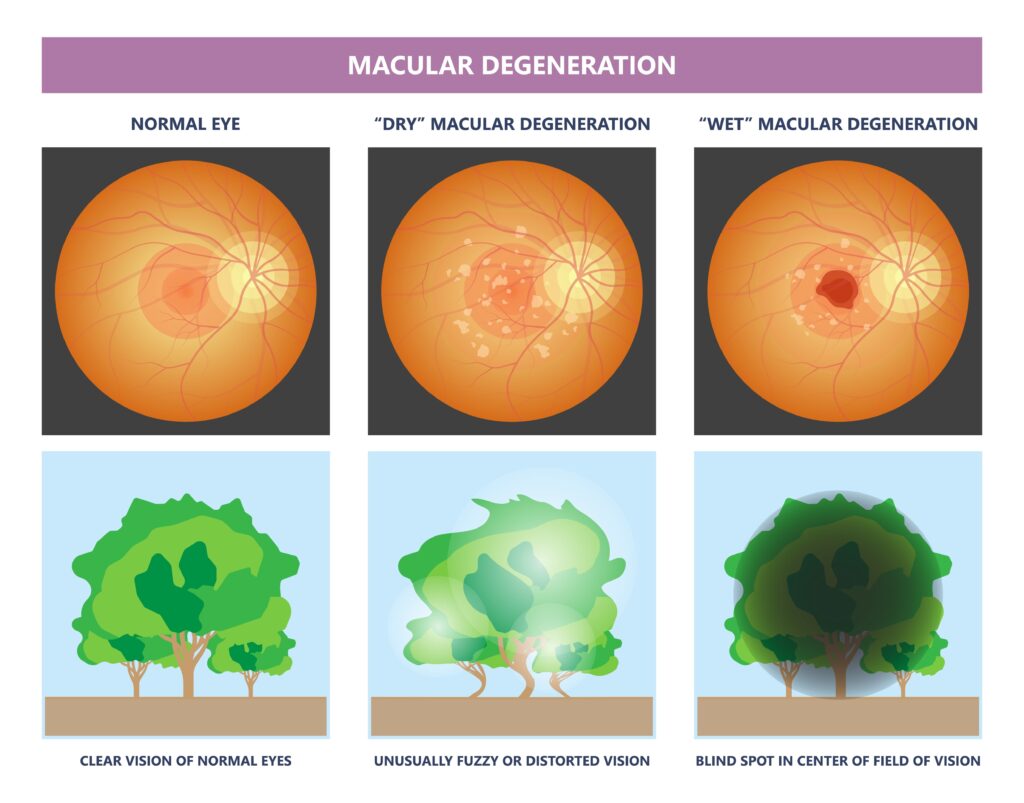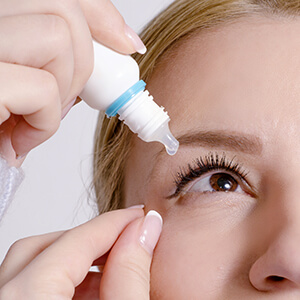
Macular degeneration is a common condition, often asymptomatic early on, which affects older individuals increasingly after the age of 60. The macula is the center of the retina in the back of the eye and is responsible for the central part of the vision allowing us to read and see fine detail. With age, this central portion of the retina can undergo degenerative changes which, if severe, can lead to loss of central vision.
Recently it has become clear that genetics plays a major role in the susceptibility to macular degeneration and a positive family history in parents and siblings is a risk factor. Other risk factors include smoking, female gender and Caucasian race.
Macular degeneration is usually divided into two categories: wet and dry. The dry form is more common. In this case, the pigment layer behind the macula undergoes atrophy and can accumulate deposits of waste material, called “drusen”, which are visible to Dr. Greenberg as yellowish spots in the back of the eye.
Early on, dry macular degeneration may not affect the vision, but in more severe cases, vision can become blurred or blank areas may appear in the central vision. There is no known effective way of improving dry macular degeneration, but it has been proven that antioxidants lutein and zeathanthin, Zinc and vitamins E, and C, in specific doses, can slow progression and reduce the risk of vision loss.
Wet macular degeneration is the result of tiny abnormal new blood vessels that grow and break into the space behind the macula, causing leakage of blood and fluid. It is often preceded by dry degeneration, and Dr. Greenberg can identify people who may be at risk for the development of this more severe form of the disease. Wet macular degeneration is less common, but when it occurs, can cause more serious loss of vision. Symptoms may begin as gradual progressive blurring or distortion of the vision. Straight objects such as telephone poles or venetian blinds may appear crooked. Sometimes the loss of vision occurs abruptly and with no warning.
Macular degeneration can be diagnosed by Dr. Greenberg with a dilated fundus exam in the office. Many times other in-office testing, such as angiography, a photographic test involving the injection of intravenous dye, or ocular coherence tomography (OCT), a sophisticated digital imaging test of the macula, may be necessary to diagnose and formulate the appropriate treatment.
Frequently Asked Questions
What Is the Difference between Wet and Dry Macular Degeneration?
There are two types of age-related macular degeneration (ARMD), wet and dry. Dry is more common (80%), and it results from proteins, called drusen, that accumulate in the macula (the focusing area of the retina). Wet macular degeneration is less common (20%) but more serious, and it occurs when new, abnormal blood vessels grow and leak into the retina.
Who Is at Risk for ARMD?
You are more likely to develop ARMD if you:
- eat a diet high in saturated fat (found in foods like meat, butter, and cheese)
- are overweight
- smoke cigarettes
- are over 50 years old
- have hypertension (high blood pressure), heart disease or high cholesterol
- have a family history of AMD
- are Caucasian
How does Dr. Greenberg diagnose ARMD?
As part of a comprehensive eye exam, Dr. Greenberg will put dilating drops in your eyes to examine your retina with a special lens looking for signs of macular degeneration such as drusen. Also, using an OCT (optical coherence tomographer), detailed images can be captured to further assess the macula at the cellular level. Dr. Greenberg may also recommend a fluorescein angiogram, which is where an orange vegetable dye is injected into a vein, typically in your arm, and a special camera is used to photograph the dye travelling through the blood vessels of the eye to look for leakage of abnormal blood vessels. These images give Dr. Greenberg information for her to make a treatment plan.
How does Dr. Greenberg treat dry ARMD?
Right now, only dry ARMD with thinning of the retina called geographic atrophy (GA) has an FDA approved treatment. Two new medications are available: pegcetacoplan and avacincaptad pegol. One of these can be injected into your eye to slow the thinning which may help slow vision loss.
There is no treatment for drusen. However people with lots of drusen or serious vision loss might benefit from taking a certain combination of nutritional supplements. A large study (AREDS and the later AREDS 2 study) found people with certain drusen may slow their dry ARMD by taking these vitamins and minerals daily:
- Vitamin C (500 mg)
- Vitamin E (400 IU)
- Lutein (10 mg)
- Zeaxanthin (2 mg)
- Zinc (80 mg)
- Copper (2 mg)
- Dark leafy greens, yellow fruits and vegetables, fish, and a balanced, nutrient-rich diet have been shown beneficial for people with AMD
How do you treat wet ARMD?
To help treat wet ARMD, Dr. Greenberg uses anti-VEGF drugs. Anti-VEGF treatment helps reduce the number of abnormal blood vessels in your retina. It also slows any leaking from blood vessels. This medicine is delivered to your eye through a very slender needle.
How is ARMD monitored?
Depending on what kind of macular degeneration you have, dry or wet, and how severe it is, Dr. Greenberg will make a recommendation for the frequency of your visits. In between visits, you should check the Amsler Grid daily for signs of progression and report any changes to Dr. Greenberg’s office.






